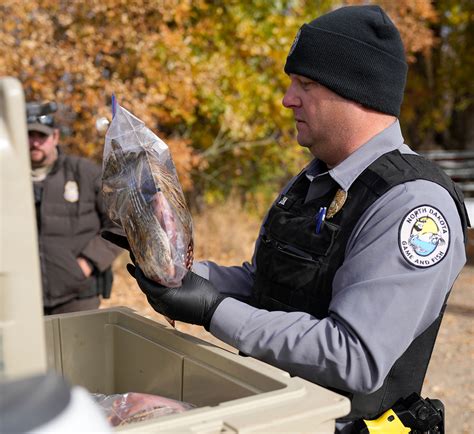Introduction:
Game and fish wardens, also known as conservation officers, are sworn law enforcement officers responsible for protecting wildlife, fish, and their habitats. They play a crucial role in ensuring the sustainable use of natural resources while safeguarding the environment and the public interest.

Duties and Responsibilities:
The duties of game and fish wardens are vast and encompass a wide range of responsibilities, including:
- Wildlife Management:
- Monitor wildlife populations and conduct surveys to assess species abundance and health.
- Implement conservation measures to protect threatened and endangered species.
-
Regulate hunting and fishing activities to ensure sustainable harvesting practices.
-
Fishery Management:
- Enforce fishing regulations to protect fish stocks and aquatic habitats.
- Monitor water quality and investigate fish kills to maintain healthy ecosystems.
-
Promote responsible fishing practices to prevent overfishing and habitat degradation.
-
Law Enforcement:
- Enforce laws and regulations related to hunting, fishing, boating, and environmental protection.
- Investigate wildlife crimes, such as poaching, trafficking, and illegal hunting.
-
Apprehend and prosecute offenders to deter illegal activities.
-
Education and Outreach:
- Educate the public about wildlife conservation, fishing regulations, and environmental laws.
- Conduct workshops, presentations, and outreach programs to raise awareness and promote stewardship.
- Foster relationships with landowners, stakeholders, and community members to promote responsible resource use.
Education and Training:
Becoming a game and fish warden requires rigorous education and training. Most states require candidates to have a bachelor’s degree in natural resources management, wildlife biology, or a related field. Additionally, they must complete a comprehensive training program that covers topics such as:
- Wildlife and fisheries management
- Law enforcement techniques
- Environmental protection
- First aid and emergency response
Challenges and Rewards:
Game and fish wardens face numerous challenges in their work, including:
- Physical Dangers: Working in remote and often rugged areas exposes wardens to wildlife encounters, inclement weather, and hazardous conditions.
- Emotional Strain: Dealing with wildlife emergencies, poaching investigations, and wildlife conflicts can be emotionally taxing.
- Public Misunderstanding: Wardens may face resistance or criticism from individuals who do not understand the importance of conservation or who engage in illegal activities.
Despite the challenges, game and fish wardens find immense rewards in their work. They derive great satisfaction from:
- Protecting Nature: They play a vital role in preserving wildlife, fish, and their habitats for future generations.
- Enforcing the Law: Wardens ensure that laws and regulations are upheld to protect natural resources and ensure public safety.
- Educating the Public: They make a real difference by educating the public about environmental conservation and responsible resource use.
Current Trends:
Game and fish warden agencies are constantly adapting to emerging challenges and opportunities. Some notable trends include:
- Technological Advancements: Agencies are using new technologies, such as drones and thermal imaging, to improve their monitoring and enforcement capabilities.
- Collaboration: Wardens are collaborating more closely with other law enforcement agencies, landowners, and conservation organizations to address complex environmental issues.
- Community Involvement: Agencies are recognizing the importance of engaging with local communities to foster partnerships and promote stewardship.
The Future of Game and Fish Wardens:
The role of game and fish wardens will continue to evolve in the years to come. As human populations grow and environmental pressures intensify, wardens will become even more critical in protecting wildlife, fish, and their habitats.
Tips and Tricks:
- Stay Informed: Keep up-to-date on the latest wildlife and fisheries regulations, conservation practices, and law enforcement techniques.
- Build Relationships: Foster partnerships with other agencies, landowners, and community stakeholders to enhance your effectiveness.
- Be Adaptable: Prepare yourself for a wide range of situations and challenges, both in the field and in the courtroom.
- Practice Patience: Dealing with wildlife emergencies and enforcing regulations can require a great deal of patience and diplomacy.
- Seek Continuing Education: Attend workshops, conferences, and online courses to expand your knowledge and skills.
Common Mistakes to Avoid:
- Underestimating the Physical Demands: Game and fish warden work can be physically demanding, so be sure to prepare yourself accordingly.
- Ignoring Public Concerns: It is important to listen to the concerns of the public and address them respectfully, even if you do not agree with them.
- Failing to Document: Proper documentation is essential for law enforcement and conservation efforts. Always maintain accurate and detailed records.
- Acting Impulsively: Avoid making hasty decisions or taking unnecessary risks. Always consider the potential consequences of your actions.
- Neglecting Your Health: Game and fish warden work can be stressful and demanding. Prioritize your physical and mental well-being.
Conclusion:
Game and fish wardens are dedicated professionals who play a vital role in protecting wildlife, fish, and their habitats. Their duties encompass a wide range of responsibilities, from wildlife management and law enforcement to education and outreach. As environmental challenges continue to emerge, the role of game and fish wardens will become even more critical in the years to come.
Tables:
| Rank | State | Number of Game and Fish Wardens |
|---|---|---|
| 1 | California | 1,200 |
| 2 | Texas | 500 |
| 3 | Florida | 450 |
| 4 | Michigan | 300 |
| 5 | Washington | 250 |
| Region | Average Salary |
|---|---|
| Northeast | $60,000 |
| Southeast | $55,000 |
| Midwest | $52,000 |
| Southwest | $50,000 |
| West | $58,000 |
| Enforcement Percentage |
|---|
| Hunting Violations |
| Fishing Violations |
| Boating Violations |
| Other Violations |
| Education Level | Percentage of Game and Fish Wardens |
|---|---|
| Bachelor’s Degree | 70% |
| Associate’s Degree | 20% |
| High School Diploma | 10% |
Useful Resources:
- International Association of Fish and Wildlife Agencies (IAFWA)
- National Association of Conservation Law Enforcement Officers (NACLEO)
- Association of Fish and Wildlife Agencies (AFWA)
- National Fish and Wildlife Foundation (NFWF)
